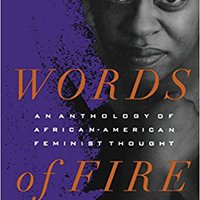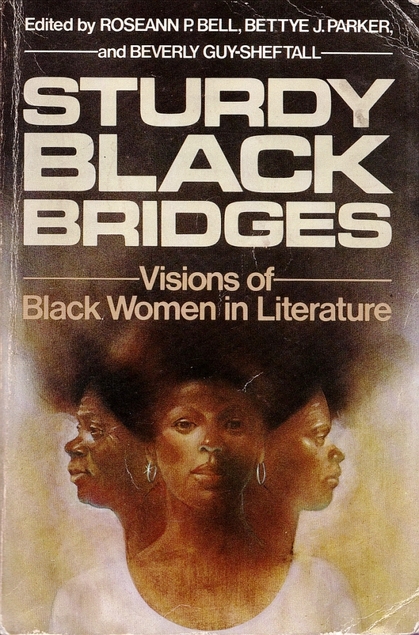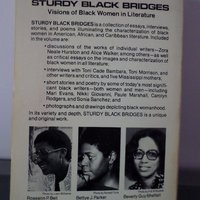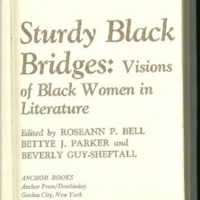-
Title
-
Sturdy Black Bridges: Visions of Black Women in Literature
-
This edition
-
"Sturdy Black Bridges: Visions of Black Women in Literature" . Ed. Roseann P. Bell, Bettye J. Parker, and Beverly Guy-Sheftall. Garden City, NY: Anchor/Doubleday, 1979. xxxi+422 pp.
-
Table of contents
-
The analytical vision. Introduction : the analytical vision / Roseann P. Bell and Bettye J. Parker -- War on African familyhood / Iva E. Carruthers -- Images of Black women in modern African poetry : an overview / Andrea B. Rushing -- "Introduction" to Ama Ata Aidoo's "Dilemma of a ghost" / Karen C. Chapman -- The African heroine / Marie Linton-Umeh -- The awakening of the self in the heroines of Ousmane Sembene / Sonia Lee -- The Caribbean woman as writer / Eintou Apandaye -- Black women poets from Wheatley to Walker / Gloria T. Hull -- The politics of intimacy : a discussion / Hortense Spillers -- Images of self and race in the autobiographies of Black women / Mary Burgher -- Black Eve or Madonna? A study of the antithetical views of the mother in Black American literature / Daryl C. Dance -- An essay on Alice Walker / Mary Helen Washington -- Alice Walker : "The diary of an African nun" and Du Bois' double consciousness / Chester J. Fontenot -- The women of Bronzeville / Beverly Guy-Sheftall -- The influence of voodoo on the fiction of Zora Neale Hurston / Ellease Southerland -- Bridges and deep water / Jerry D. Ward.
The conversational vision -- Introduction : the conversational vision / Roseann P. Bell -- Ann Petry talks about first novel / James W. Ivy -- Relections : Arthenia Bates Millican / Bettye J. Parker -- Judgment : Addison Gayle ; Substance : George Kent / Roseann P. Bell -- Commitment : Toni Cade Bambara speaks / Beverly Guy-Sheftall -- Complexity : Toni Morrison's women--an interview essay / Bettye J. Parker -- Wisdom : an interview with C.L.R. James / L. Anthony-Welch -- Mississippi mothers : roots. Lillie V. McKenzie ; Annie Amiker (Aunt Sis) ; Johnnie Ruth Pearl Ellis (Aunt Saint) ; Lena (Gorgeous) Smith ; Malinda Wango / Bettye J. Parker -- Gayl Jones takes a look at "Corregidora"--an interview / Roseann P. Bell.
The creative vision. Introduction : the creative vision / Beverly Guy-Sheftall -- The collector of treasures / Bessie Head -- An African tribute / Samuel Otoo -- Return of the native / Paule Marshall -- The word is love / Lorna V. Williams -- Mis' Lou / Jacquelyn Furgus Hunter -- Arah : one ; Arah : two ; Letter to the lady # 3 ; Arah : five ; Arah : six ; Poem for a Rasta daughter / Marvin Williams -- Angela Davis / Nicolás Guillén -- The 7:25 trolley / Mari Evans -- Lineage / Margaret Walker -- The women gather / Nikki Giovanni -- 10:15 A.M.--April 27, 1969, poem / Sonia Sanchez -- Southlands : the double year / Nathaniel Johnson -- Cleaning out the closet / Mae Jackson -- Alice / Paulette Childress White -- Ritual / Oyoko Loving -- Women's lib / Margaret Danner -- Sundown sigh / Melba Joyce Boyd -- Lovesong for Rochelle / Kenneth A. McClane -- cracked ; Sometimes as women only ; Parade / Gloria Gayles -- Turning corners / Lynn Suruma -- In a minute / Robert Alvin Bell -- from "The book of life" / Haki R. Madhubuti -- The neighborhood / Betty De Ramus -- Solstice / Audre Lourde -- It is deep / Carolyn Rodgers.
-
Reviews and notices of anthology
-
• Blicksilver, Edith. "Black American Literature Forum" 13.4 (1979): 158:
The opening "analytical" essays outline the matriarchal inflections in African myths and cultures and contrast this with the patriarchalism of Western cultures: "according to Andrea B. Rushing's insightful analysis, the Europeans, having no parallel in their own sexist culture, ignored these [matriarchal] traditions when they replaced African social structures with colonial institutions. Whereas the colonial view was that the impact of Western civilization liberated oppressed African women, the revisionist view is that such codes cut women loose from their cultural moorings and provided no replacement for the institutions they destroyed. Fortunately, in sharp contrast to the many negative images of European-American women as shrews, bitches, dumb blondes, old maids, and sex kittens, African attitudes toward women absorbed positive female images in oral literature. (Though in Afro-Caribbean poetry, women are portrayed as primitives—superstitious, hip-swinging temptresses surrounded by snake imagery)" (158). [Cf., in this regard, Diedre L. Bádéjo. "African Feminism: Mythical and Social Power of Women of African Descent." "Research in African Literatures" 29.2 (1998): 94-111. "JSTOR".]
• Boulware-Miller, Kay. "Harvard Educational Review" 49 (Nov. 1979): 542:
"[This is a volume of] writings by, about, and for black women and their admirers. Although it is a noteworthy example of scholarly investigation in this area, it is a superficial portrayal of the diversity of black women throughout the world. . . . [The book] contains lengthy studies of various aspects of the literature on the black woman. However, [they]. . . generally fail to interpret creatively the images, forms, and perspectives of this literature. . . . The interviews are revealing and intelligent, as well as delightfully colorful and socially pertinent. . . . [The creative] literature which is included is inspiring. . . . [However] the structure of the book does not achieve the symmetry which could diversify and categorize our conceptions of the black woman and her critics. . . . It is unfortunate that the potential for a complete and realistic portrayal of the black woman remains unrealized" (excerpt from "Book Review Digest").
• Garner, Robert. "Black Scholar" 11 (Sept. 1979): 87-88:
"The editors have ably accomplished the task of presenting and organizing essays, stories, poems, and interviews dealing with black women in the context of a triumphant vision of the history and future of African people" (87). Some of the resistance to or contention about feminist politics within the African American community is evident in Beverly Guy-Sheftall's interview with Addison Gayle, "in which Gayle stresses his view that our fight is with 'this country' and not each other" (88) and in the reviewer's own remarks about Bessie Head's short story "The Collector of Treasures": "It is a story set in Southern Africa (the country is never named) of a woman who castrates her estranged husband and who is sent to prison. The story is artificial, sexist (women are created as superior to men), and melodramatic in its use of stereotypes and vilence. 'The Collector of Treasures' is representative of the extreme and sterile positions sometimes held in confrontations between black females and black males" (88).
• Hill, Patricia Liggins. "Umoja: A Scholarly Journal of Black Studies" 5.1 (1981): 68-70.
• Hunter, Kathryn Montgomery. "Modern Language Review" 77.4 (1982): 943-44:
"This book is full of treasures: critical and historical essays on literature by and about black women, bibliographies of women writers and essays on women in black literature, interviews with authors and literary critics, poems, short stories, photographs, and drawings" (943); but the book "is necessarily uneven, often carelessly proof-read, and so awkwardly designed that Margaret Walker's long lines are broken in two and Phillis Whatley's couplets occupy four lines each. Nevertheless, wonderful photographs by several hands and Richard Powell's splendid drawings make it a beautiful book, and readers moderately familiar with black literature in English will find many new things in its generous, varied, and energetic survey of a topic neglected in literature an in society" (944).
• Stineman, Esther. "Library Journal" 104 (15 June 1979): 1339:
"So little has been available on the work of black women writers and so much needs to be clarified about what black women have written and the images they have projected that this excellent collection of critical essays, overview articles, interviews and excerpts cannot help but be significant. . . . In addition to the critical foci and the substantial sampling from works by black women that this anthology brings together, three hefty bibliographies accompany the text---on African, African-American, and Afro-Caribbean women writers For high school, public, and academic library collections that claim to attend to the black female literary experience, [this volume] will be a priority purchase" (excerpt from "Book Review Digest")
-
Commentary on anthology
-
• Although the volume was published by Doubleday, a major commercial publisher, one of the editors, Beverly Guy-Sheftall, has remarked, "We never got any money for that book. Our major motivation was to get the book out" (Peter Benjaminson. "Publish Without Perishing: A Practical Handbook for Academic Authors". Washington, DC: National Education Association, in association with the National Writers Union, 1992. 14); she adds that, "There was no promotion of my book, but I understand that's fairly common" (99).
• "Although the anthology does not explicitly call itself a black feminist one, I suggest that beyond its concern for the image of black women, "Sturdy Black Bridges" advocates a black feminist mode of analysis in terms of the 'politics of intimacy,' a phrase taken from Spillers's essay of the same title. . . . Placing the inclusionary objectives of the black feminist critic in conversation with the aesthetics priorities of the black woman writer, the anthology inter-articulates the activities of aesthetic representation and critical engagement through the politics of intimacy" (Aisha Peay. "Reading Democracy: Anthologies of African American Women's Writing and the Legacy of Black Feminist Criticism, 1970-1990." Diss. Duke U, 2009. 23-24)
• In their introduction, the editors emphasize "the diasporic nexus" of the anthology's critical perspective—incorporating and discussing as it does works of African, Caribbean, and African American authors. This anthology, thus, belongs in the section on diasporic and other wider-framework anthologies. But it has been such a foundational text for the development of black feminist criticism in the US that it seemed important to include it in this main enumeration. Nonetheless, it's important to keep in mind that "one of the anthology's critical underpinnings is Afrocentricity—a discourse coined by Molefi Kete Asante in "The Afrocentric Idea" (1987)—in that it uses a Pan-Africanist mode of analysis to derive an essentialist notion of African blackness" (Peay 2009: 189).
-
Cited in
-
• Kinnamon 1997: 467 (gives date of publication as "1980").
-
Item Number
-
A0216
 Words of Fire: An Anthology of African-American Feminist Thought
Words of Fire: An Anthology of African-American Feminist Thought




